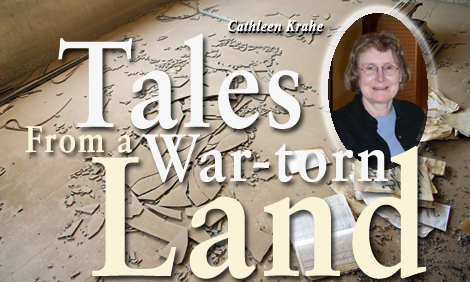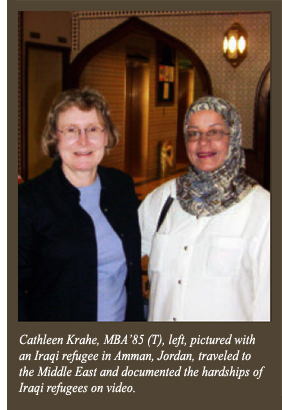
“They told of
their churches
being destroyed
and being forced
to leave their
country under the
threat of death.
They cried for the
loss of their
homes.”

Refugees Tell Volunteer of Desparate Plights
Cathleen Krahe, MBA’85 (T), was tired of hearing about Iraq only from politicians and military officials. So she decided to travel to the Middle East to meet those directly impacted: Iraqi citizens.

While the Carbondale, Colo., resident wanted to go to Baghdad, she was advised that the dangers were too great. So, she became involved with Global Exchange, a San Francisco-based human rights group that sponsors international tours designed to connect people from different cultures and to break down stereotypes. The group visited Jordan and Syria in June 2006 and met with Iraqi refugees displaced by the fighting. “I don’t think people realize that there is an Iraqi refugee problem,” says Krahe, who noted that hundreds of thousands have fled their homeland.
“The conditions for the refugees are pretty devas-
tating,” Krahe says, adding that many had suffered great hardships. They have lost homes, jobs and loved ones. They also are struggling to find money, food and housing. … “Some are forced to beg.”“The conditions for the refugees are pretty devastating,” she says, adding that many had suffered great hardships. They have lost homes, jobs and loved ones. They also are struggling to find money, food and housing. They lack medical care and other support services and are resented by the local population. “Some are forced to beg.”
Krahe brought a video camera to document the stories of the Iraqis, but many were too scared to be filmed. “They were afraid of the repercussions from cooperating with Americans.”
Still, Krahe managed to shoot enough footage during her two-week visit to produce three documentaries that were eventually aired on local television stations in Colorado. Among those depicted were a female civil engineer who fled Baghdad after her son was kidnapped and a female pharmacist who had her own business but who can no longer work in the city because of the dangerous conditions. Krahe says, “The female professionals described how they had lost many of their rights under the new constitution.”
The most moving part of the experience for Krahe was visiting with former Abu Ghraib prisoners. “They had been arrested for no reason, but they were incredibly nice to us,” she recalls. One of the men’s sons, after seeing how his father was treated, declared that he hated all Americans. “That man invited us to his home because he didn’t want his son to hate all Americans.”
In Syria, Krahe met with a group of Iraqi Christians who “were very angry that we [the United States] had invaded and put fundamentalists in power. They told of their churches being destroyed and being forced to leave their country under the threat of death. They cried for the loss of their homes.”
Krahe, who has worked as an investigator for the U.S. Food and Drug Administration and an executive for a pharmaceutical company, adds that the trip gave her a “better understanding of what it is like to lose your home, your job, your country. These people are so upset their country is being destroyed.”
People-to-people
connections are
the best way
to break down
misunderstand-
ings that divide
nations and
cultures, Krahe
says.
Earlier in 2006, Krahe traveled to Iran, where she visited a professor friend who had taught in the United States. Although it is hard to travel there alone, Krahe says, Iran is “a safe place to be, and I would encourage people to visit.”
Krahe is hoping to travel again to Iran in the fall and also wants to visit Israel and the Palestine territories. She adds that people-to-people connections are the best way to break down misunderstandings that divide nations and cultures. “We need to talk to the people our foreign policies affect.”
After developing strong bonds with some of the refugees, Krahe stays in touch with several of them. One woman she met, who formerly held a teaching position, now struggles to make a living as an artist. Krahe and a fellow Carbondale resident have helped her sell her paintings in the United States.
She also regularly receives e-mails from refugees who have returned to Baghdad and who are desperate. One woman described narrowly surviving a taxi bomb. Another described the lack of electricity and water and the abundance of killers and thieves, writing, “Baghdad looks like [a] graveyard of hell.”
“Baghdad looks like [a] graveyard of hell.”
Krahe says the stories and the heartbreak are “overwhelming.” She adds that, “sometimes the only thing we can do is just listen to them.” She recalls one Iraqi telling her the “best way Americans could help them was to change our government’s policy.” Krahe adds that everyone she met said the United States was making a bad situation worse and that the troops needed to leave.
Upon her return, Krahe produced the videos and also did newspaper and television interviews to spread the word about the Iraqis’ plight. Still, she says pessimistically, “I don’t think many American people care about what’s happening to Iraqis, and they know that over there.”
— A.C.
Surgeon Proud | Soldier’s Story | Nursing the Wounded
Scales of Justice | Article Home
FDU Magazine Home | Table of Contents | FDU Home | Alumni Home | Comments
©Copyright 2007 Fairleigh Dickinson University. All rights reserved.
For a print copy of FDU Magazine, featuring this and other stories, contact Rebecca Maxon, editor, 201-692-7024 or maxon@fdu.edu.